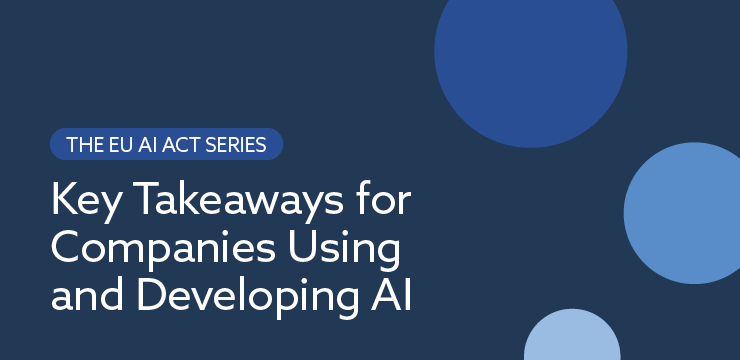AI Literacy Under the EU AI Act: 5 Tips for Companies to Consider
2 minute read | October.21.2024
This update is part of our EU AI Act Series. Learn more about the EU AI Act here.
Developers and users of AI systems subject to the EU AI Act must adopt AI literacy measures by 2 February 2025. The Act requires them “to ensure, to their best extent, a sufficient level of AI literacy” among staff and others who operate and/or use AI systems on their behalf.
What is AI Literacy?
- AI literacy should equip providers, deployers and others to make informed decisions regarding AI systems.
- The European Commission and Member States may develop voluntary codes of conduct to advance AI literacy, but the law does not require them to do that.
- Any initiative to promote literacy should consider technical knowledge, experience and education. It also should cover how an organization plans to use AI systems.
- Promoting AI literacy goes beyond training related to the AI Act, although this will be an element for regulated organisations. The focus and content will vary depending on the context but can include:
- Understanding the correct application of technical elements in the AI system’s development phase.
- Measures to apply during use of an AI system and the suitable ways to interpret the system’s output.
- The knowledge to understand how decisions taken with AI’s assistance will affect people.
5 Tips to Consider to Promote AI Literacy
1. Adopt, promote and circulate principles to employees and contractors on using AI in your organization.
2. Develop an acceptable AI use policy and incorporate it into internal and supplier-facing policies.
- Involve managers and department heads from the outset in developing policy.
- Department heads should serve as points of contact for implementation difficulties or questions.
3. Consider forming an internal cross-functional AI working group.
- The group could oversee choices relating to procuring, developing and deploying AI systems.
- Ideally, knowledge about AI’s opportunities and risks should not be limited to the IT department.
4. Train employees regularly to raise awareness of AI risks, legal obligations and compliance with AI policies.
- Include training for new hires.
- Update training materials often to keep up with rapid changes in AI developments.
- Provide employees with real-world scenarios and hands-on exercises, taking into account their varying levels of knowledge.
5. Emphasize to employees the importance of AI skills.
- Include acquiring AI skills in your strategic goals.
- Demonstrate the importance throughout all levels of the organization.
Want to know more? Reach out to a member of our team.

